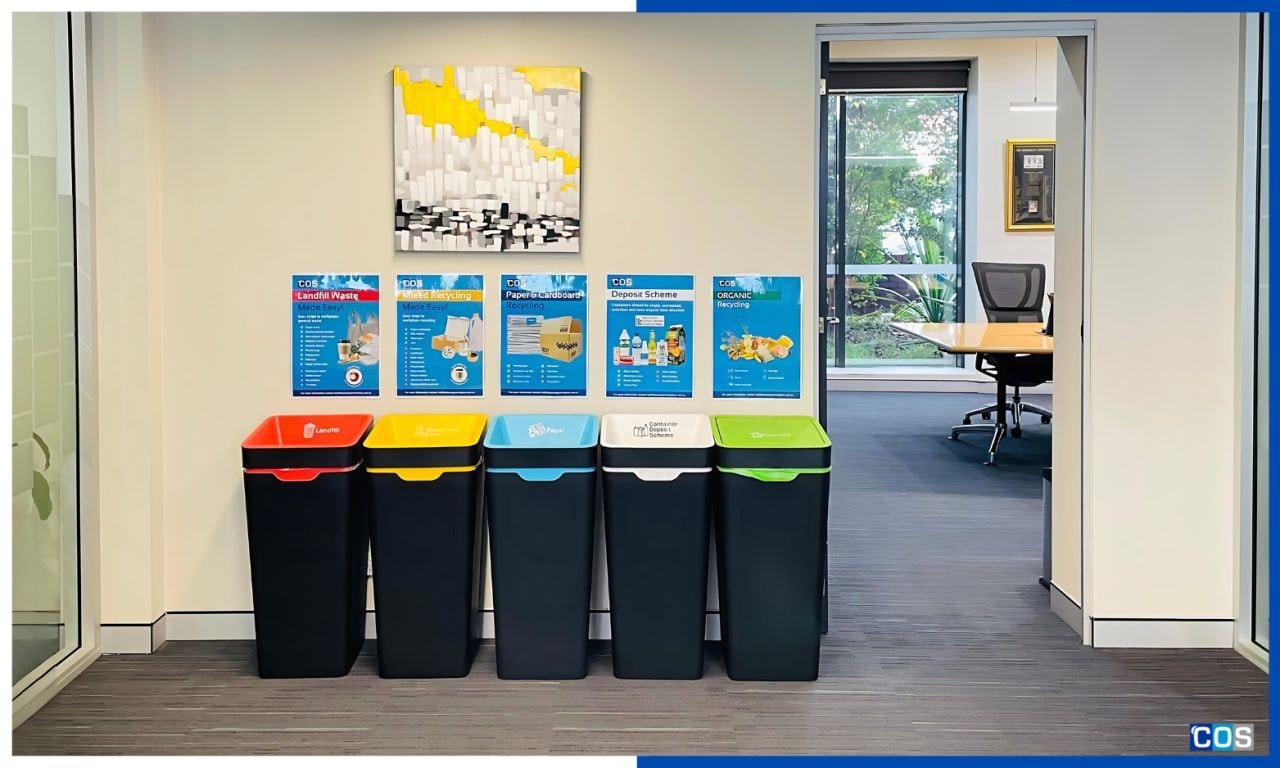Partnering in Sustainability: Method Recycling and COS Join Forces
Method is excited to officially partner with COS, the largest Australian-owned and operated office product supplier. We’ve chosen COS as a preferred partner because of their long-term commitment to sustainability, reputation for service excellence, and new Zero Waste Initiative.
The Workplace Experts
Founded in 1977, COS has over 45 years of experience sourcing the best supplies for Australian workplaces and delivering them with exceptional service.
There are hundreds of decisions to be made in an office—the pens you use, the toilet paper, computer stands, ergonomic chairs, bins—the list is endless. All as important as the next (have you ever tried changing the pens in an office?).
The complexity ramps up when we add sustainability, durability, and other procurement questions – it's a tireless job. COS is a comprehensive provider that simplifies the decision-making process with an extensive understanding of the needs of the workplace.
With over 600 employees and warehouses in every state and territory, COS has extensive coverage. Every day, COS delivers thousands of products to workers, patients, and students across Australia to help keep them healthy, safe, and productive.
It’s this reputation that lets us know that they have the foundational understanding of workplace behaviour and need to excel at supporting organisations through the implementation of successful recycling programs.
Walking the Talk
COS is leading by example and is the first to take up its own Zero Waste Initiative. Bin stations with five to six streams are being rolled out at all of their workplaces to maximise waste separation, paired with signage and education. The initiative aims to significantly reduce landfill waste, lower carbon emissions, and continue to foster a culture of sustainability within the workplace.
 COS' new Method Recycling station in their Sydney office
COS' new Method Recycling station in their Sydney office
COS have been working on their impact for years. In 2013, COS installed the industry's first and largest solar farm, then began their path to net zero in 2016, identifying the primary contributors to their emissions, with waste ranking fourth. Their dedication was recognised when they were named a ABA100 Winner for Sustainability in the Australian Business Awards in 2021 – and it's still growing, with COS achieving 100% renewable energy in 2023 and net zero operations in the first quarter of 2024.
What advice do you have for other businesses?
We asked COS, what their advice is for other businesses looking to tackle waste, they said:
With mandatory carbon reporting soon to be a reality there is going to be more transparency around waste for businesses. In Australia alone 76 million tonnes (Mt) of waste per year are generated, the equivalent to about 2.95 tonnes per person, so it’s important that individuals and companies alike make changes to make the future greener.
A new study commissioned by COS, surveyed over 1,000 Australian workers and found that 66% wish their company would make more effort to recycle or reduce waste, with 74% believing that recycling regularly is the most impactful thing they can do for the environment.
Interestingly, while 85% of people stated that in their personal lives, they actively engage in practices at home to recycle and reduce waste, only 70% do so in the workplace, demonstrating that workplaces are behind in separating waste.
COS co-CEO Belinda Lyone says, “Australia’s recycling rate currently sits stagnant at 60%, but this study highlights how many employees actually want to recycle more but are lacking the tools to do so in the office. If businesses make it easy to recycle and reduce waste this figure could significantly increase and greatly benefit the planet.”
Our advice is to:
Swap personal bins with communal ‘smart’ bin:
Rather than having under desk bins and hoping that employees or the cleaner sort the rubbish correctly, placing larger bins in communal areas that have different waste streams is an extremely efficient way in limiting the amount of waste sent to landfill. For example, products like B-Corp Certified Method Recycling bins effectively separate different forms of waste such as plastics, food scraps, cardboard etc, meaning organisations can limit the amount of waste going to landfill. This not only saves money and reduces their carbon footprint, but also limits greenhouse gasses, as decomposing landfill waste releases methane, a potent contributor to climate change.
Have clear signage near all bins:
Whether companies adopt smart bins or not, having clear signage and guidance of what can and can’t be recycled near the bins ensures maximum employee participation and efficiency, especially with data showing that 50% find it confusing to know what can and cannot be recycled.
Implement an initiative:
Since it’s evident that so many workers want their workplace to make more sustainable choices, participating in an initiative or day such as International Compost Awareness Week - which takes place in May - is an effective way to engage with workers on the topic, and highlight how the company wants to do their part to reduce their carbon footprint.
Belinda Lyone, Co-CEO of COS, “Every business has the power to make a significant impact. By incorporating any of the above examples into the workplace, a company is not just adopting a waste management solution; it’s joining a movement towards a more sustainable future.”